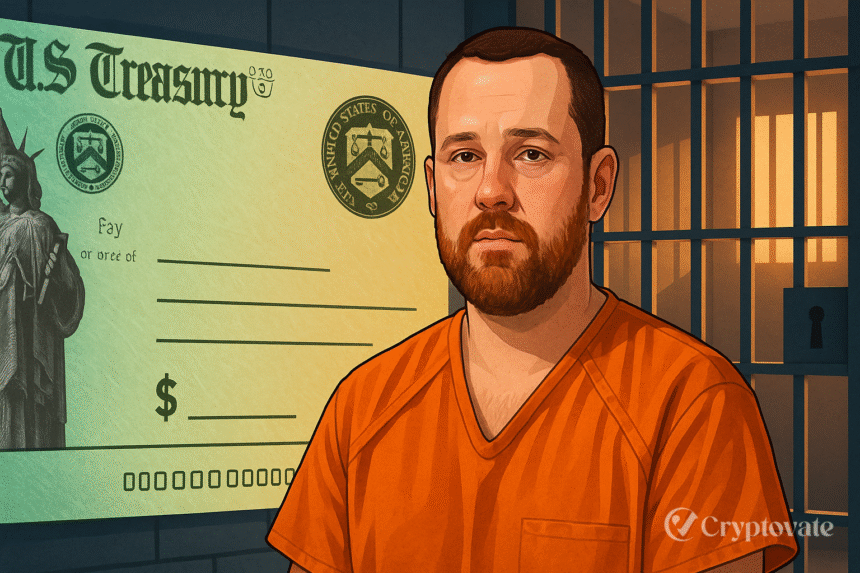– Ad –
| Getting your Trinity Audio player ready... |
In a shocking case of financial fraud, Kyle Eugene Duncan-Carle, a 41-year-old Las Vegas resident, has been sentenced to six years in prison for orchestrating a $7.97 million U.S. Treasury check heist. The scheme, which unfolded between January and September 2023 in the District of Utah, involved stealing Treasury checks and exploiting stolen identities, resulting in $3.49 million in losses to the U.S. government, financial institutions, and an insurance provider. This high-stakes crime has landed Duncan-Carle behind bars, with a hefty restitution order and a warning about the consequences of financial misconduct.
The Fraud Scheme Unveiled
Duncan-Carle’s operation was both bold and calculated. He stole at least eight U.S. Treasury checks, assumed the identities of their rightful recipients, and opened credit union accounts under those false identities. By depositing the stolen checks, he siphoned off millions, leaving a trail of financial devastation. The scheme caused significant losses, with the government and other victims bearing the brunt of $3.49 million in damages. His actions didn’t just defraud institutions—they betrayed the trust of individuals whose identities were exploited.
The investigation, led by the IRS Criminal Investigations, the IRS Treasury Inspector General for Tax Administration, and the FBI Salt Lake City Field Office, uncovered the full extent of Duncan-Carle’s crimes. Arrested in Lyon County, Nevada, in 2023, he faced charges of bank fraud, aggravated identity theft, and receipt of stolen government property. His guilty plea sealed his fate, leading to a 72-month prison sentence and five years of supervised release.
Consequences and Restitution
Beyond prison time, Duncan-Carle was ordered to pay nearly $3.5 million in restitution to cover the losses inflicted. This case underscores the severe penalties for financial crimes, especially those involving government funds. The U.S. Treasury, a cornerstone of the nation’s financial system, became the target of Duncan-Carle’s greed, highlighting vulnerabilities in check-based systems. His sentence serves as a deterrent to others contemplating similar schemes.
Why This Case Matters
This case sheds light on the growing threat of identity theft and financial fraud. Criminals like Duncan-Carle exploit personal information to access funds meant for legitimate recipients, causing chaos for individuals and institutions alike. The $3.49 million in losses reflects not just financial damage but also the erosion of trust in systems designed to protect citizens. Federal agencies’ swift action in this case demonstrates their commitment to combating such crimes, but it also raises questions about how to prevent future fraud.
Also Read: BitMEX Outsmarts Lazarus Group: How a Crypto Exchange Exposed North Korean Hackers
Protecting Yourself from Similar Scams
To avoid falling victim to identity theft or financial fraud, individuals should monitor their financial accounts regularly, use strong passwords, and be cautious about sharing personal information. Reporting suspicious activity to authorities promptly can help mitigate damage. This case is a stark reminder to stay vigilant in an era where financial crimes are increasingly sophisticated.
Duncan-Carle’s story is a cautionary tale of greed and consequence. His six-year sentence and massive restitution order reflect the gravity of his actions. As financial systems evolve, so too must efforts to safeguard them from those who seek to exploit vulnerabilities for personal gain.
FAQs
What did Kyle Duncan-Carle do to get sentenced?
He pilfered $7.97 million in U.S. Treasury checks, exploited stolen identities to set up credit union accounts, and withdrew the money, leading to $3.49 million in damages.
How long is Kyle Duncan-Carle’s prison sentence?
He received a 72-month (six-year) prison sentence, with five years of supervised release to follow.
How much restitution was Duncan-Carle ordered to pay?
He was ordered to pay nearly $3.5 million to cover losses to the government, financial institutions, and an insurance provider.
Which agencies investigated the Treasury check fraud case?
The IRS Criminal Investigations, IRS Treasury Inspector General for Tax Administration, and FBI Salt Lake City Field Office led the investigation.

















